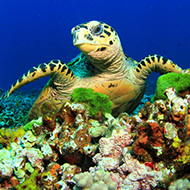
Researchers say an overall decline in amphibians makes them a priority for conservation efforts.
Researchers at the University of Edinburgh have concluded that common animal species are just as likely to rise or fall in number in response to global change as those of rare species.
Scientists say their findings, published in the journal Nature Communications, suggest a need to look beyond only rare animals in a bid to improve global biodiversity conservation efforts.
Until now, critically endangered animals were thought to be at greater risk of decline than common species. However, this new research reveals a 'wide spectrum' of population changes.
The findings suggest that numbers within the most common animal species are as likely to increase or decrease, as rare ones. Species with a smaller number, however, were found to be more likely to change from year to year, potentially increasing their risk of extinction in the long term.
Study leader Gergana Daskalova, said: “We often assume that declines in animal numbers are prevalent everywhere. But we found that there are also many species which have increased over the last half of a century, such as those that do well in human-modified landscapes or those that are the focus of conservation actions.”
In the study, researchers analysed nearly 10,000 animal populations recorded in the Living Planet Database between 1970 and 2014. These records include mammals, reptiles, sharks, fish, birds and amphibians.
The team found that 15 per cent of all populations declined during the period, while 18 per cent increased and 67 per cent showed no significant change. Amphibians were the only group in which populations decreased, while birds, mammals and reptiles experienced increases.
Scientists say the overall decline in amphibians makes them a priority for conservation efforts, as their loss could have knock-on effects in food chains and wider ecosystems.
Study co-author Dr Isla Myers-Smith said: “Only as we bring together data from around the world, can we begin to really understand how global change is influencing the biodiversity of our planet.”



 The Veterinary Medicines Directorate (VMD) is inviting applications from veterinary students to attend a one-week extramural studies (EMS) placement in July 2026.
The Veterinary Medicines Directorate (VMD) is inviting applications from veterinary students to attend a one-week extramural studies (EMS) placement in July 2026.